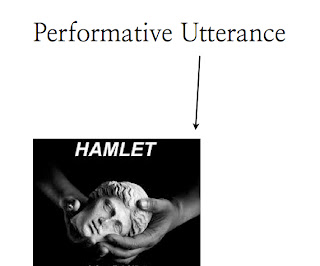Without the philosophy of performative utterance, Hamlet is just a lot of words followed by little action. However, when the idea that words themselves can be actions, Hamlet becomes much more eventful. The theory of performativity explains how words don’t merely describe the physical world, but can influence reality. All of the promises, overhearings, and declarations intertwined make up not only the majority of the plot of Hamlet, but also have the ability to influence our reality.
Hamlet’s character is revealed more by what he says, rather than what he does. First of all, this has something to do with Hamlet being a play and therefore the audience get most of what they know from the characters words and actions. Shakespeare must give light to the characters inner-selves through soliloquies or speeches. Another example of performative utterance is Hamlet’s oath to the ghost of his father, to remember him and in turn avenge his murder. This sets the stage for the rest of the play. When Hamlet says “It is “Adieu, adieu. Remember me.” I have sworn’t.” he understands what he needs to do due to the locutionary force. Although it takes Hamlet the length of the play to actually commit this act of revenge, by swearing to do so in Act I he brings the actions to reality and makes it tangible, rather than merely a thought. A thought has no real meaning, it is just a fleeting idea. However, according to performative utterance, a word is much different than a thought. A word, for example Hamlet’s promise, can be heard by Hamlet himself and others and the actions the listeners take is what makes this word a reality. Over the course of the play Hamlet becomes more and more frustrated with himself and his inability to put action behind his promise. His promise has had locutionary force, it has been said aloud and heard. His promise has had illocutionary force, it has been understood as a oath to do something. However his promise is lacking in perlocutionary force, because nothing has been achieved and no consequences have yet to come from it.
“Self-overhearing” is the driving concept, behind Hamlet finally giving his promise perlocutionary force. Many soliloquies, whose primary function were to give the audience insight on Hamlet’s inner-self, actually gave Hamlet insight on himself. By overhearing his own thoughts said aloud, he knew what he had to do, however grew frustrated with his inability to act and lack of emotion. In the end, after hearing himself state his duty repeatedly, it became more and more and doable. Also, because of hearing it so many times he becomes numb to the initial shock of killing his own family, and the act becomes even more realistic. In the end, he does avenge his father’s murder and put perlocutionary force behind his promise to the ghost.
Performative utterance is applicable beyond the literary world. People put words to action everyday, in ways like pronouncing to be married or making a promise to a friend. “Self-overhearing” is also something people do daily without even realizing it. When you are having a conversation with a friend about a decision you have to make, by putting words to your thoughts and making them understandable to your friend, you are experiencing locutionary and illocutionary force. When you hear your own thoughts sometimes they sound different outside of your head than in and the influence this has on your final decision is perlocutionary force after “self-overhearing”.
Hamlet struggled with making words a reality, as do real people today, the theory of performative utterance explains, that words and actions are intertwined and words have influential force on actions.








